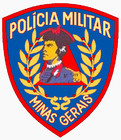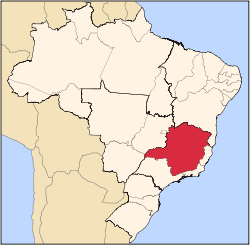- Military Police of Minas Gerais State
-
Minas Gerais Military Police
Polícia Militar de Minas Gerais - PMMGAbbreviation PMMG Badge of the Minas Gerais Military Police. Motto "Our duty, your life" Nossa profissão, sua vida Agency overview Formed June 09, 1775 Legal personality Governmental: Government agency Jurisdictional structure Operations jurisdiction* State of Minas Gerais, Brazil Map of Minas Gerais Military Police's jurisdiction. General nature Operational structure Headquarters Belo Horizonte Website [1] Footnotes * Divisional agency: Division of the country, over which the agency has usual operational jurisdiction. The Polícia Militar de Minas Gerais (PMMG) (Minas Gerais Military Police) is a law enforcement organization, of the military kind, in the state of Minas Gerais, Brazil, being the oldest state police force of the country.
It's also the second largest state police troop of all, with approximately 48,000 officers. The force is precisely distributed between the inner state and its capital, Belo Horizonte, where the PMMG headquarters stands.
The PMMG is divided into 15 administrative regions and into battalions, companies, Specialized, independent companies, platoons and detachments (the last one with effective minimum of four officers per county).
Mission and Organization
Its primary duty is to perform street patrolling and crime prevention inside both cities and rural zones, performing, also, the patrolling of highways, forests, rivers, intelligence and reconnaissance missions (called P2) and school patrolling.
History
By the time when Brazil was a colony from the Kingdom of Portugal, in the eighteenth century, by historical evidence that came to our day, driven by the lust for gold and precious stones found in Minas Gerais, flocked to the promising province huge waves of migrants from other more developed villages, as São Paulo, Rio de Janeiro, Bahia, Pernambuco and even from the metropolis.
Within this heterogeneous human mass, the only law is the law of the strongest, based on brute force and violence. Despite this state of chaos, the only concern from the Potuguese authorities was within tax issues over the resources extraction.
The people of Minas Gerais needed, even more than simple fear imposed ordinances or the biased protection of a little handful of paid mercenaries, a regular army-like band that, overcoming the greed itself, and being structured in military discipline and hierarchy, acting both in the countryside and cities with prowess, without being attracted by the glitter of gold, becoming at the same time, obedient and technically capable to fulfill their very specific missions of defend the land against the wrongdoers.
Thus, in order to prevent increasing tax evasion and the institutionalization of violence and to eradicate the climate of unrest now installed in the Province, attending the dramatic demands of the settlers, Governor Pedro Miguel de Almeida - the Earl of Assumar - refers to the King of Portugal, sending the Mines general two companies of Dragoons, consisting only of the Portuguese, who once arrived, not surprisingly (since they not fell a connection with the colony), were also infected by the dream of easy wealth, trading their guns for pans and almocafre (gold) and soon disbanding in disorder.
Given the weakening of the Companies of Dragoons and their unsatisfactory performance, the Governor of Minas Gerais - Don Antonio de Noronha - extinguished it, creating, on June 9, 1775, the Regular Cavalry Regiment of Mines, whose ranks were only listed mineiros (Minas Gerais state natives), who receive their salaries from the coffers of the captaincy and enforced ordinances with a blaze of patriotism. The thought was that the mineiros would defend the land with greater fervor, since it was their land they were defending.
In the newly created Force, would be up to fulfill missions of a military nature, through actions and operations to confront the riots, insurrections and defending the territory of the captaincy and the homeland, and in a law enforcement context, prevention and prosecution of crime, maintaining order in the population, so general peace would be easily enforced.
Over time, after the decolonization of Brazil and the establishment of the Republic, mineiros witnessed the militarization of the Armed Forces Mining, especially after the assigning of Colonel Robert Drexler, from Swiss Army, for to train soldiers in the art of war.
Decree-Law 667 and its modifications, guaranteed to the Military Police, the constitutional mission of to maintain the public peace, giving them exclusivity in the planning and implementating of civilian police duties, with substantial reformulation of the concept of "police authority" as previously practiced.
In 1988, Constituents of the Republic, established a Public Safety System, consisting of law enforcement agencies, according to Art 144 of the Constitution, with their own structures and independent, however, although with different powers, functionally interconnected, embodying the effort the Government to guarantee the rights of the citizen and society, preventing and combating violence and crime.
Notable officers from the past times
Brazilian former president Juscelino Kubitschek (1902–1976) was a medical doctor and former commissioned captain in the PMMG.
The famed writer Guimarães Rosa (1908–1967) also served as a volunteer medical doctor in the ranks of the PMMG, holding no military rank however.
The hero of the troop, colonel Fulgêncio de Sousa Santos (1896–1932), also served in the PMMG, with the rank of colonel.
Law enforcement in Brazil Federal State Civil Police Military Police Local See also Categories:- Military police of the states of Brazil
Wikimedia Foundation. 2010.


